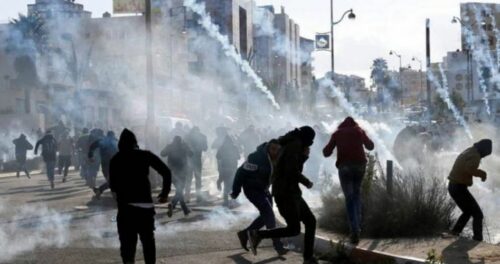Israeli troops attacked a group of Palestinians who were protesting the Israeli settlement expansion in Beita village Friday, wounding at least 20. The soldiers also opened fire on four ambulances carrying people who had been wounded by army fire.
Fifty more Palestinians suffered from tear gas inhalation, and were treated on-site. Some Palestinian youth tried to kick or throw the tear gas canisters back toward the invading army forces.
Israeli soldiers fired live gunfire, coated bullets & stun grenades at Palestinians in #Beita wounding 70 – over 50 suffer inhalation injuries pic.twitter.com/V7vtKv6m7x
— Sarah Wilkinson (@swilkinsonbc) September 3, 2021
According to local sources, the protest began after Friday prayers and lasted for several hours on Jabal Sbaih (Mount Sbaih) in Beita, south of Nablus.
Ahmed Jibril, the ambulance and emergency official at the Palestinian Red Crescent, told reporters with the Ma’an News Agency that 20 civilians were wounded by rubber-coated metal bullets, and three of them were transferred to Rafidia Governmental Hospital for treatment.
Jibril added that over a hundred Palestinian civilians suffered from tear gas inhalation as a result of the Israeli forces firing tear gas canisters, in addition to the use of unmanned drone aircraft to stop teargas canisters into the crowd.
Among those who suffered from tear gas inhalation were a number of medics who were targeted while treated the wounded.
A recent report by Agence France Presse told how, over the past four months, Palestinians from Beita have come together across party lines and using unique non-violent techniques, to challenge the illegal Israeli seizure of their land.
According to that report, “Using laser pointers and noisy horns to torment Jewish settlers across the valley, Palestinians in Beita have set themselves apart from others demonstrating against Israeli presence in the West Bank. But beyond attention-grabbing tactics, protesters in the Palestinian town near Nablus insist their weeks-long campaign against the wildcat settlement of Eviatar is distinct for another reason.
“They describe it as a grassroots movement, not inspired or directed by Fatah secularists who control the Palestinian Authority in the West Bank, or their rivals from the Islamist Hamas that runs the Gaza Strip.
‘Here there is only one flag: That of Palestine. There are no factions’, Said Hamayel told AFP.
“‘We are doing from below what Palestinian leaders cannot do from above,’ argued Hamayel, who said his 15-year-old son Mohammed was killed by Israeli army gunfire in a mid-June riot.”
“The Beita protest[s] broke out in May as a group of hard-line settlers erected a Jewish community on a nearby hilltop. All settlements are considered illegal under international law, but Israel has granted authorization to such communities across the West Bank, a territory it has captured from Jordan during the 1967 Six-Day War.
“But Eviatar was built without Israeli approval and the government struck a deal with settlers for their evacuation on July 2, while it studied the land to evaluate the prospect of eventual authorization.”
In addition to firing tear gas on Friday, and destroying roads on Thursday, Israeli forces in recent weeks have violently assaulted the thousands of Palestinians that have joined in the protests in Beita.
On Friday, July 31st, Israeli soldiers wounded 435 Palestinians during protests against the illegal colonialist activities in three areas in Beita town, near the northern West Bank city of Nablus.

